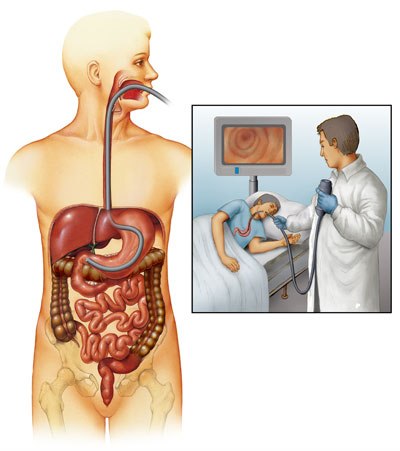
Upper GI Endoscopy
Upper GI endoscopy (sometimes called a 'gastroscopy' or simply an 'endoscopy') is a test which allows the doctor to look directly at the lining of the oesophagus (the gullet), the stomach and around the first bend of the small intestine - the duodenum. In order to do the test, an endoscope is passed through your mouth into the stomach. The endoscope is a long flexible tube (thinner than your little finger) with a bright light at the end. Looking down the tube, the doctor gets a clear view of the lining of the stomach and can check whether or not any disease is present. Sometimes the doctor takes a biopsy- a sample of tissue for analysis in the laboratory. The tissue is removed painlessly through the endoscope, using tiny forceps.

The preparation.
To allow a clear view, the stomach must be empty. You will therefore be asked not to have anything to eat or drink for at least six hours before the test. When you come to the department, a doctor will explain the test to you and will usually ask you to sign a consent form. This is to ensure that you understand the test and its implications. Please tell the doctor or nurse if you have had any allergies or bad reactions to drugs or other tests. They will also want to know about any previous endoscopy you have had. If you have any worries or questions at this stage don't be afraid to ask. The staff will want you to be as relaxed as possible for the test and will not mind answering your queries. You may be asked to take off your shirt or jumper and to put on a hospital gown. It will also be necessary for you to remove any false teeth. They will be kept safely until after the examination.
During the test
In the examination room you will be made comfortable on a couch, resting on your left side. A nurse will stay with you throughout the test. Some doctors may spray a local anaesthetic on the back of your throat or give you a tablet to suck to numb the area. The doctor may give you an injection into your arm to make you feel sleepy and relaxed but many hospitals now find that the test can be performed without any sedation, as the endoscopes have become much smaller and are easier to swallow. To keep your mouth slightly open, a plastic mouthpiece will be put gently between your teeth. When the doctor passes the endoscope into your stomach it will not cause you any pain, nor will it interfere with your breathing at any time. It may take up to fifteen minutes to examine all the areas of the stomach carefully. During this time some air will be passed down the tube to distend the stomach and allow the doctor a clearer view. The air is sucked out at the end of the test. If you get a lot of saliva in your mouth, the nurse will clear it using a sucker. When the examination is finished, the tube is removed quickly and easily.
After the test
You will be left to rest in the unit for at least thirty minutes. You will be given a drink but if you have had your throat numbed by a spray or lozenge, you will have to wait until your swallowing reflex is back to normal. This usually takes more than an hour. After this you can eat and drink normally. The back of your throat may feel sore for the rest of the day. You may also feel a little bloated if some of the air has remained in your stomach. Both these discomforts will pass, and need no medication.
Going Home
If you are going home after the test it is essential that someone comes to pick you up. Once home, it is important to rest quietly for the remainder of the day. Sedation lasts longer than you think, so if you have been given an injection during the examination you should not:
Drive a car
Operate machinery
Drink alcohol
The effects of the test and injection should have worn off by the next day when most patients are able to resume normal activities.
When do I know the result?
In many cases the doctor will be able to tell you the results straight after the test, or if you have been sedated, as soon as you are awake. However, if a sample (biopsy) has been taken for examination, the results may take several days. It is a good idea to have someone with you when you speak to the doctor after the test since if sedation has been used, people are often find they forget everything that has been said to them, and many do not recollect having the test at all. Details of the results and any necessary treatment should be discussed with your general practitioner or hospital specialist-whoever recommended you to have the test.